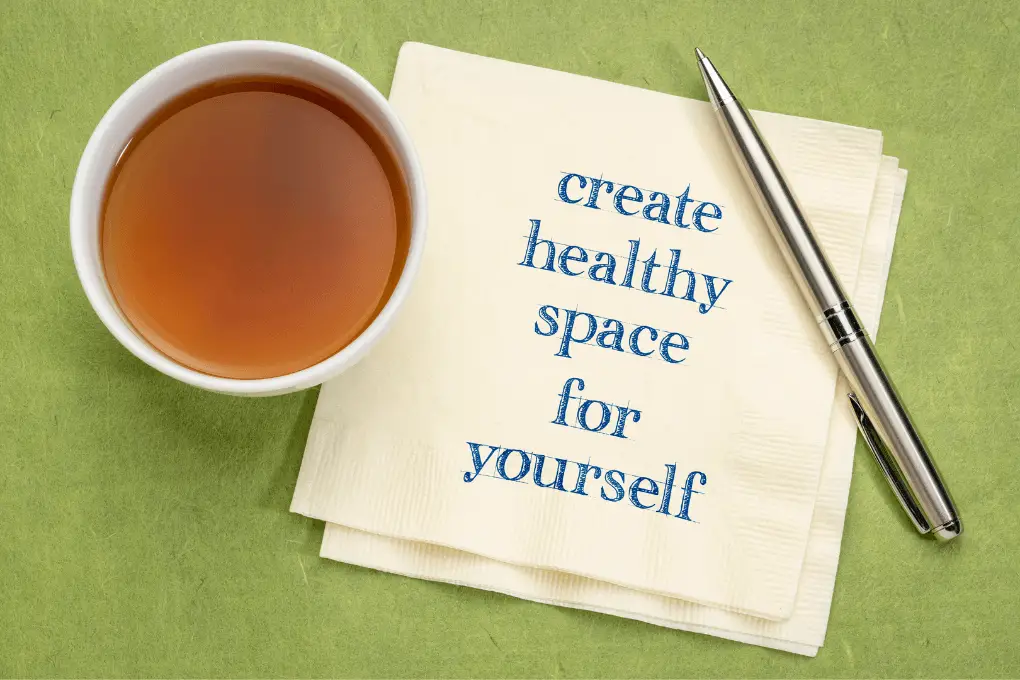You know what I’m talking about – the car that cuts you off in traffic, the spilled coffee, the missed deadline. These minor annoyances can ruin our day and drain our energy, leaving us feeling stressed and frustrated.
But guess what?
It doesn’t have to be that way. In this practical guide, I’ll equip you with simple yet effective strategies that will enable you to maintain a state of calmness and inner stability when confronted with life’s challenges.
Put simply, if you’re someone who desires greater control over your emotions and a more joyful, serene existence, then this article is an absolute must-read for you. Get ready to take charge of your emotions and start living your best life. Keep reading and discover how to not get upset over little things.
But before we dive in, let me ask you something:
Why Should You Keep Your Emotions in Check?

“Anger is like fire – it can either warm you up or burn you down.”
This adage perfectly captures the importance of understanding and controlling your emotions, as it can be easy to let our feelings get the best of us when things don’t go our way. But if we allow this to happen, it can lead to negative consequences.
The good news is that with enough practice and determination, you can learn how to keep your emotions in check and remain level-headed no matter what life throws at you. Not only will this aid in keeping you composed and concentrated during trying times, but it will also foster a more optimistic perspective on life.
Table of Contents
Tips on How to Not Get Upset Over Little Things
It’s so easy to get upset over small things, like traffic or a spilled latte, and let those emotions spiral out of control.
But here’s the thing: you have the power to stay grounded and level-headed, no matter what life throws your way.
In this section, you’ll find some practical tips and tricks that will help you keep your emotions in check and deal with stress like a pro. You’ll learn how to stay calm and centered when life throws its curveballs and how to effectively deal with stress so that it doesn’t consume you.
So, whether you’re dealing with a demanding boss, a challenging co-worker, or just the daily grind, this guide is packed with actionable advice to help you stay in control.
Let’s dive into the best tips on how to not get upset over little things:
Understand the Cause of Your Anger

Now, I know we all feel it from time to time – that fiery, intense emotion that can bubble up and make us act out in ways we regret later. But here’s the thing: anger is complex, and there’s often more to it than meets the eye.
One factor that plays a significant role in anger is genetics. Some people are simply wired to be more prone to angry outbursts, while others have a calmer disposition. But that’s not the only thing that contributes to our emotional responses. Our family dynamics and upbringing can also play a significant role in how we react to different triggers.
That’s why it’s so important to recognize the root cause of your anger before you can learn how to control it. Maybe it’s a past trauma that’s been triggered, or perhaps a current situation that’s making you feel out of control. Whatever it is, take the time to explore it and understand it.
Once you’ve identified the underlying cause of your anger, try relaxation techniques like meditation or deep breathing exercises to help manage those feelings before they become too overwhelming. And if you’re in a situation that’s causing distress, don’t be afraid to take a step back and give yourself some space. Sometimes all you need is a little clarity and perspective to figure out how best to channel your emotions.
So, remember: anger is complex, but that doesn’t mean you can’t learn to manage it. By understanding the root cause of your emotions and using relaxation techniques to stay centered, you can take control of your anger and live your best life.
You Could Use a Distraction
One of my favorite tricks is to use distraction to shift my focus. It’s an incredibly powerful tool that can help you stay calm and centered when life gets bumpy.
So, what do I mean by distraction? Well, it can be anything that takes your mind off of whatever is causing frustration. Whether going for a run, jamming out to your favorite playlist, binge-watching your favorite show, or even taking a few deep breaths and visualizing a peaceful scene, distraction can be a game-changer. It gives you a chance to take a step back, gain some perspective, and return to the situation with a fresh mindset. So, the next time you’re feeling overwhelmed by the little things, try using distractions to help you regain your focus and keep your cool.
Reduce Frustration with Self-Reflection

You see, self-reflection is all about taking a step back and looking at ourselves and our reactions to situations. It’s about recognizing patterns in our behavior and taking the time to consider whether our responses are appropriate or not.
But here’s the thing – self-reflection is not always easy. It takes practice and patience to develop this skill, but it is worth it. As we become more conscious of our thought patterns and emotional responses, we can begin to recognize instances where we may be falling into black-and-white thinking.
Here’s a tip: whenever you feel that familiar frustration rising, instead of immediately reacting, try taking a moment to pause. Count backward from 10 slowly while focusing on your breathing. This brief moment allows you to assess the situation more objectively so that you can decide whether it’s worth getting upset over or if there are better ways to handle the issue.
But wait, there’s more. We also need to be aware of the impact others have on our emotions. Don’t let their negativity control yours by giving them power over how you feel. You are in control of your feelings, and you can choose how you respond to situations.
Choose Compassion
Now, I know what you’re thinking – how can being compassionate help me deal with that rude driver who cut me off in traffic this morning?
Well, here’s the thing – compassion is not just about being nice to others. It’s about being mindful of our emotions and reactions and not letting them control us.
When we choose compassion, we are choosing to understand and empathize with another person’s suffering without judgment or expectation. It’s about recognizing that everyone is going through their own struggles and that we don’t always know what’s happening in someone else’s life. By practicing compassion, we can learn to be more patient, understanding, and kind – not just to others but to ourselves as well.
And here’s the best part – choosing compassion can be a powerful tool in helping us not get upset over little things. When we’re able to recognize our own emotions and reactions, we can take a step back and respond in a more thoughtful, intentional way. Instead of lashing out at someone else, we can take a deep breath, recognize our own frustration, and choose to respond with kindness and understanding.
Practice Self-Care

Let me tell you, practicing self-care is an absolute game-changer when it comes to not getting upset over the little things. It’s all about taking care of yourself, both mentally and physically, so that you can handle anything life throws your way with ease.
So, what exactly is self-care?
Well, it can be different for everyone, but it basically involves doing things that make you feel good and prioritizing your needs. That could mean going for a run, taking a relaxing bath, or even just sitting down with a cup of tea and a good book.
But why is self-care so important? For starters, it helps to reset our emotional balance, which makes it easier to respond to situations with a clearer head. When we take time to look after ourselves, we’re better equipped to handle stress and stay calm in challenging situations.
And here’s the thing – self-care doesn’t have to be complicated. In fact, there are three types of self-care that can make a massive impact on your life:
First up, is physical self-care. This means taking time to rest and nourish your body with the food, water, and exercise it needs. So, ensure you’re getting enough sleep, eating nutritious meals, and moving your body regularly.
Next, we have mental self-care. This involves taking breaks throughout the day to process your thoughts and emotions. That could mean going for a walk, practicing mindfulness, or taking a few deep breaths.
Last but not least, we have spiritual self-care. This is all about connecting with yourself and those around you meaningfully. It could be practicing gratitude, spending time in nature, or engaging in activities that bring you joy.
So, there you have it – three types of self-care that can help you stop getting upset over little things and start living your best life. Remember, taking care of yourself isn’t selfish – it’s necessary. So, prioritize self-care, and watch as your life transforms for the better.
Let Go of Expectations

Let’s be honest; we all have expectations – whether it’s the perfect date night, the ideal job, or the way we want our friends and family to behave. But what happens when those expectations aren’t met? We get upset, angry, and frustrated.
And guess what? It’s not worth it.
When we hold on to our expectations too tightly, we set ourselves up for disappointment. We create a version of reality in our heads that may not align with the actual situation. And when things don’t go as planned, we feel let down.
But here’s the thing – we can’t control everything. Life is unpredictable, and people are human.
So, what can we do? We can let go of our expectations.
When we release our grip on what we think should happen, we open ourselves up to new possibilities. We permit ourselves to be present at the moment and appreciate what is happening rather than focusing on what isn’t.
Now, I know what you might be thinking – “Isn’t it important to have goals and aspirations?”
Of course! But there’s a difference between setting intentions and attaching ourselves to a specific outcome. When we hold on too tightly to what we think should happen, we limit ourselves and our potential.
Create Space For Yourself

Life can be overwhelming at times. There’s work, family, social obligations, and the list goes on and on. It’s easy to get caught up in the chaos and lose sight of what’s essential.
But guess what? Taking breaks throughout the day and carving out time for yourself can make all the difference.
Think of it like this – when you’re feeling frazzled and stressed out, your mind is like a computer that’s running too many programs at once. It needs time to shut down and reboot. That’s where creating space for yourself comes in. Whether it’s five minutes in the morning, a quick break during the day, or some quiet time before bed, finding moments to be still and calm your mind can make a world of difference.
Taking care of yourself is essential if you want to handle unexpected challenges and stressors without losing your cool. So, find those moments throughout your day to breathe, relax, and recharge. Your mind (and your sanity) will thank you for it.
Reduce Stimulants

I know – we all love our coffee and sugary treats, but the truth is, they can wreak havoc on our emotions. That’s why cutting back on these stimulants is crucial for maintaining a more even-keeled mood.
But the good news is that you don’t have to give up caffeine altogether. Just start by cutting back a little bit each day. Swap out your coffee for herbal tea or decaf, or try a natural energy boost like a quick walk outside or some deep breathing exercises.
And when it comes to sugar, be mindful of hidden sources like processed foods and drinks. Stick to natural sweeteners like honey or fresh fruit, and you’ll be amazed at how much better you feel.
And let’s not forget about alcohol – while it might seem like a quick fix for stress; it can actually make things worse in the long run. So, if you want to stay level-headed and in control of your emotions, try cutting back on your drinking or eliminating it altogether. Your mind and body will thank you for it.
So there you have it – reducing stimulants is a simple but powerful way to keep your emotions in check and stop getting upset over little things. Give it a try and see how much of a difference it can make in your life!
Identify Triggers
Truth be told, identifying triggers is not an easy process. It requires us to take a deep look inside ourselves and confront some uncomfortable truths. But it’s essential to understand why we react the way we do and learn how to manage our emotions effectively.
So, take a moment to reflect on what makes you angry or anxious. Is it an argument with a loved one? Feeling overwhelmed at work? Maybe it’s just a general sense of loneliness.
Whatever it is, it’s important to acknowledge these feelings so that when those trigger moments come up, we can be prepared to handle them.
It’s also crucial to dig deeper and understand the root cause of these emotions. Are they related to real issues, or are there hidden emotions beneath the surface? By recognizing our triggers and being honest about our emotional states, we create a foundation for ourselves that allows us to handle even the most difficult situations better.
Now, I know it’s not always easy to take a step back and assess how we’re feeling in the moment but trust me, it’s worth it. By gaining clarity over our reactions, we can develop relaxation techniques that support long-term growth and help us stay in control.
Practice Relaxation Techniques

Look, I know life can be stressful and overwhelming, and it’s easy to get worked up over little things. But, as I mentioned earlier, there are ways to stay calm and centered even when things don’t go your way. One of those ways is by practicing relaxation techniques like yoga, meditation, and deep breathing exercises.
Let me tell you, I’m a huge fan of yoga and meditation. These practices have helped me tremendously in my own life. Not only do they help me manage my stress and anxiety, but they also help me stay focused and energized throughout the day. And when it comes to managing feelings of anger, there’s no better tool than deep breathing.
Many of us don’t have the time to do yoga or meditation — and that’s okay! You don’t have to spend hours on end practicing these techniques to reap their benefits. Even just a few minutes of deep breathing can make a huge difference in how you feel.
So, the next time you feel upset over something small, take a deep breath. Take a deep breath in through your nostrils, counting to four. Hold that breath for four counts, and then exhale slowly through your mouth for another four counts. Repeat this process a few times, and you’ll be amazed at how much better you feel.
Seek Professional Help
Look, we all get angry from time to time, but when it starts to affect our daily life and relationships, that’s when it’s time to take action. And the best move you can take is to seek the help of a mental health professional, like a therapist or counselor.
There’s no shame in admitting that you need help. It takes real strength and courage to recognize when you need something more than you alone can handle.
A mental health professional can provide personalized guidance and support and teach you practical coping skills tailored to your individual needs. They can help you understand why you’re feeling angry and work with you to develop strategies for managing those feelings in a healthy way.
So, if you find that your anger is starting to get out of control, don’t hesitate to reach out to a mental health professional. It could be the best decision you ever make for yourself and your loved ones.
Establish Healthy Habits

Taking care of yourself doesn’t have to be complicated or time-consuming. It’s all about making small, sustainable changes that add up over time.
One of the most significant benefits of establishing healthy habits is that it can help you manage your anger. When we experience feelings of anger or frustration, it can be tempting to resort to unhealthy coping mechanisms such as overeating or substance abuse. But when we care for our bodies, we’re better equipped to handle life’s challenges in a healthy, productive way.
So, what are some healthy habits you can start implementing today? First and foremost, make sure you’re getting regular exercise. This doesn’t mean you have to spend hours at the gym – even a 10-minute walk around the block can help release pent-up anger and tension. And if you can make exercise a part of your daily routine, even better!
Next up, make sure you’re eating a well-balanced diet. You don’t have to give up all your favorite foods. Instead, try to incorporate more fruits, vegetables, and lean proteins into your meals. And if you struggle with emotional eating, try keeping a food diary to help you stay mindful of what you’re putting into your body.
Last but not least, make sure you’re getting enough sleep. When we’re tired, we’re more likely to be irritable and short-tempered. Make it your goal to get a minimum of 7-8 hours of sleep per night and create a calming bedtime routine that aids in unwinding and relaxation.
Frequently Asked Questions
What are common signs of anger?

It’s essential to recognize the common signs of anger before it spirals out of control.
When you’re angry, you might feel a rush of heat in your face, clench your fists or grind your teeth. Maybe you start speaking louder than usual, feeling agitated and impatient with those around you. Or perhaps you’ve noticed yourself becoming more aggressive towards others, finding it harder and harder to contain your emotions.
Identifying these warning signs can help you stop them from manifesting into something bigger – allowing you to stay calm and collected even in challenging situations.
How can I identify my triggers of anger?
It’s essential to identify what triggers your anger so you can avoid it. To do this, pay attention to the moments leading up to feeling angry and ask yourself questions like “What did I think just before getting mad?” or “Was there something that happened earlier in the day that was similar?”.
You’ll soon start recognizing patterns of behavior or situations that make you feel frustrated or angry so that you can prevent them from happening again.
How can I practice self-compassion when I’m angry?

Instead of dwelling on what made you feel this way or trying to suppress the anger, take a step back and focus on your breathing. Remind yourself that these emotions are temporary, and try to think more positively about the situation.
You may also find it helpful to talk through your anger with someone who can offer support or constructive advice – such as a friend, family member, or therapist.
What techniques can I use to relax when I’m feeling agitated?
When we’re feeling agitated, it can be difficult to relax. Thankfully, there are plenty of techniques you can use to help ease the tension and restore calm. From deep breathing exercises to mindfulness meditation practices and even progressive muscle relaxation, there’s something for everyone when it comes to finding relief from agitation.
Take some time each day to practice these methods. With regularity and consistency, you’ll soon find yourself more relaxed in various situations.
How can I establish healthy habits to prevent anger from occurring?

Establishing healthy habits is vital to preventing anger and frustration from occurring. Start by acknowledging the initial physical sensations in your body when feeling agitated; this can help you become aware of what’s happening quickly before it escalates. Take some deep breaths, practice mindfulness meditation, or go for a walk outside – all of these can help calm down any negative emotions that arise.
Additionally, make sure to get enough sleep, eat well-balanced meals throughout the day, exercise regularly, and stay hydrated so you’re best equipped to handle stressful situations with a level head.
Key Takeaways on How to Not Get Upset Over Little Things

It’s important to recognize and address our anger triggers, practice self-compassion, and develop healthy habits to prevent ourselves from getting upset over little things. Taking the time to do these things can seem like an impossible feat, but with dedication and persistence, it can be done!
So go ahead – take a deep breath and start taking control of your emotions today. Don’t forget that it’s perfectly okay to reach out for support from those you trust. There’s no shame in asking for help, and in fact, it can be a sign of strength and courage to acknowledge when you need assistance. So don’t hesitate to lean on your trusted friends and family as you work towards emotional regulation.
Managing anger is a journey, and it may take time to see progress. But by taking small steps every day, you can learn how to not get upset over little things and live a happier, healthier life.
Disclaimer: This post may contain affiliate links. Meaning, if you click on one of the product links, I will earn a small commission at no cost to you. Thank you for supporting Creativity Mesh.
Why Trust Creativity Mesh? At Creativity Mesh, our mission is to help you unlock your creative potential, increase your productivity, and achieve your personal and professional goals. We provide well-researched, informative, and actionable content focused on topics related to creativity, productivity, and self-development. We are committed to being transparent, honest, and unbiased in everything we do. Our content is designed to help you make informed decisions and take meaningful action to improve your life. Thank you for choosing Creativity Mesh as your trusted source for creativity, productivity, and self-development.






